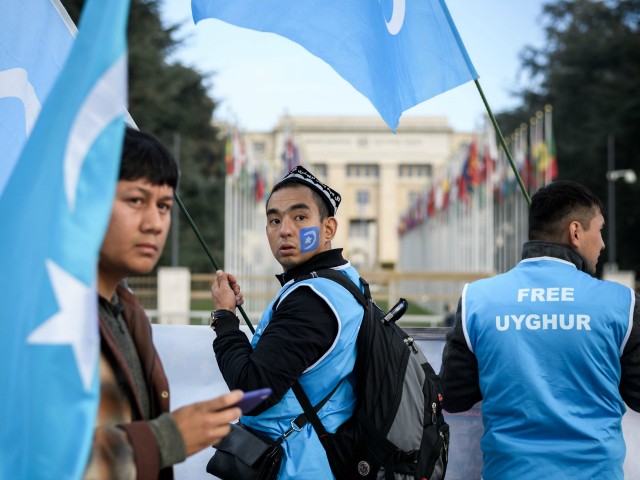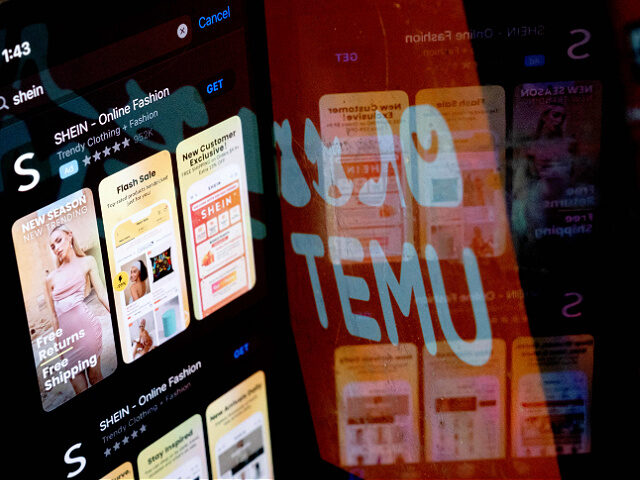Chinese e-commerce company Temu launched a campaign targeting American consumers reportedly worth tens of millions of dollars this weekend, spearheaded by massive spending on Super Bowl advertising.
Temu – a subsidiary of the parent company of Chinese e-commerce giant Pinduoduo – sells household goods, clothing, and other items at steep discounts. It is able to do so, a congressional investigation revealed in June, because it has no meaningful safeguards to ensure that its products are not made by slaves and manufactures its products in a country engaging in arguably the largest state-sponsored slavery operation in the world.
The sudden ubiquity of the company in the United States, and its ability to compete with top American retailers, has alarmed human rights groups and members of Congress, some of whom have openly lamented the White House’s inaction to prevent Americans from being exposed to slave-made goods.
Speaking to Breitbart News, lawmakers lamented that a key piece of legislation – the Uyghur Forced Labor Prevention Act – is failing to keep slave-made goods out of American hands because of loopholes that allow companies such as Temu to thrive. Others criticized the Department of Homeland Security (DHS) for failing to blacklist companies like Temu for their “support for slave labor.”
The Chinese Communist Party is currently engaging in a genocide of Uyghur and other Turkic peoples in East Turkistan, an occupied region west of China. Part of the genocide has involved imprisoning millions of people in concentration camps that Beijing refers to as “vocational and educational training” facilities, where survivors reported, among other atrocities, being forced into slavery. The landmark 2020 Uyghurs for Sale report, by the Australian Strategic Policy Institute (ASPI), revealed that dozens of household name brands around the world use Chinese suppliers to make their products that use Uyghur slaves, shipped to factories throughout the country from East Turkistan.

Uyghurs people demonstrate against China outside of the United Nations (U.N.) offices (FABRICE COFFRINI/AFP/Getty Images).
The Uyghur Forced Labor Prevention Act (UFLPA), which went into effect in June 2022, bans companies from importing goods into America that come from East Turkistan – what China calls the “Xinjiang Uyghur Autonomous Region” (XUAR) – unless they can prove with evidence that the goods were not made by slaves. The UFLPA only applies to shipments worth over $800 – an exception known as de minimis – which means the average American purchase from Temu, shipped directly from China, would not receive UFLPA scrutiny. The law also does not address shipments from outside of East Turkistan, despite mounting evidence that Chinese authorities are selling Uyghur slaves to factories nationwide.
“Chinese companies like Temu and Shein exploit a loophole in U.S. law to avoid tariffs and accountability for their ties to slave labor,” Sen. Marco Rubio (R-FL), who introduced the UFLPA and has introduced legislation to close the de minimis loophole, told Breitbart News this week. “Two things need to happen. First, the Biden Administration needs to enforce my Uyghur Forced Labor Prevention Act to crack down on slave-made goods entering the U.S.”
“Second, Congress needs to pass my bipartisan Import Security and Fairness Act to close this loophole entirely for Chinese imports,” he added. “Every day we wait, millions more packages from Communist China flood into our country, endangering American customers and undermining American businesses.”
The Import Security and Fairness Act would eliminate the exception that allows for shipments worth less than $800 to escape UFLPA scrutiny. It was introduced in June in both the Senate and the House of Representatives.
Uyghur leaders, who enthusiastically supported the UFLPA, have also called for closing the de minimis loophole. Salih Hudayar, the foreign minister of the East Turkistan Government in Exile, told Breitbart News on Tuesday that legislation such as the Import Security and Fairness Act was a “crucial” response to China’s genocide.
“The East Turkistan Government in Exile fully supports the Import Security and Fairness Act, which aims to close loopholes exploited by Chinese entities like Temu/Shein,” Hudayar said. “This legislation is crucial in combating forced labor and ensuring accountability for China’s ongoing genocide in Occupied East Turkistan. We urge the Congress to swiftly pass this bill to protect vulnerable populations and uphold fundamental human rights principles.”
The urgency of containing Temu’s expansion in America escalated this weekend after the company aired three ads during the Super Bowl, showing computer-animated people happily shopping for household goods and other items at dramatically low prices. While networks do not typically confirm the price of such ads, financial reporters estimated this weekend that a Super Bowl advertisement cost an estimated $7 million, meaning the three ads likely cost Temu around $21 million – in addition to another $15 million Temu is investing in giveaways and other promotions in America:
The ads appear to have worked. According to the left-wing outlet NPR, “On Apple’s list of shopping apps as of Tuesday, Temu held No. 1, followed by Shein and then Shopify and Amazon.” Shein is a Chinese “fast fashion” company that sells mostly women’s clothing, using the same high-discount and small-shipment model as Temu.
Temu’s growing profile in the American consciousness has prompted widespread concern among human rights activists, lawmakers, and others aware of its business model. During a hearing on financial crimes at the House Financial Services Committee on Wednesday, Rep. Blaine Luetkemeyer (R-MO) asked Brian Nelson, under secretary of the Treasury for Terrorism and Financial Intelligence to explain what his agency was doing to combat human rights abuses by the Chinese government.
“You just had a Super Bowl. Temu had a big ad in the Super Bowl. They use slave labor to make their garments — make their products. They don’t deny that,” Rep. Luetkemeyer explained. “They say, ‘No, we don’t,’ but they don’t make any effort to hide the fact that they don’t really care one way or the other. Are they on your list? Are they getting ready to be on your list of sanctioned entities?”
Nelson replied that his office takes “referrals from civil society” on entities to monitor and would “take on board that concern” regarding Temu, but he did not commit to any action.
“I don’t know why you can’t do something about this,” Rep. Luetkemeyer replied:
In remarks to Breitbart News, Luetkemeyer lamented that DHS has been ineffective in protecting Americans from companies that benefit from slavery.
“As part of the Uyghur Forced Labor Protection Act, the Department of Homeland Security leads a task force made up of other Executive Branch bureaucracies. Its goal is to identify and deter companies implicated in the use of forced labor,” he explained. “They compiled lists of companies throughout the production process, but one category remains blank.”
“DHS claims it hasn’t identified any ‘relevant entities’ exporting products into the United States that originated in Chinese forced-labor camps. Temu has built an entire business model around doing just that,” he continued.
Rep. Leutkemeyer recalled the House Select Committee on the Chinese Communist Party’s report in June that specifically named Temu as a concerning entity.
“American consumers should know that there is an extremely high risk that Temu’s supply chains are contaminated with forced labor,” the leaders of the committee said in announcing the release of the report. “And all companies operating in the United States have an obligation to clean up their supply chain and ensure that they are not contributing to the CCP’s genocide of the Uyghur people by facilitating the sale of goods made with forced labor.”
“Temu does not have any system to ensure compliance with the Uyghur Forced Labor Prevention Act (UFLPA),” the report itself read. “This all but guarantees that shipments from Temu containing products made with forced labor are entering the United States on a regular basis, in violation of the UFLPA.”
“The Select Committee on the Chinese Communist Party [CCP] released a detailed report almost a year ago proving Temu’s connection to atrocities in the Xinjiang region,” Leutkemeyer told Breitbart News on Wednesday. “National media outlets are reporting the same thing, yet the DHS task force remains silent.”
“Whether due to ignorance or cowardice, failing to even acknowledge this CCP-linked company’s support for slave labor is unacceptable,” he added. “It is another tragic and disappointing example of the Biden administration rolling over for China.”
“Making matters worse, President Biden’s inflation crisis is driving more and more Americans to seek cheaper products. It’s hard to blame them for seeking relief, but that money is going straight to fueling the CCP’s agenda. The administration claims it wants to stop genocide and forced labor, but it has thus far failed to do anything about it,” the congressman concluded.
Temu insisted in a statement to NPR, in light of the increased scrutiny on the company, that evidence that it benefits from slave labor is “completely ungrounded.”

COMMENTS
Please let us know if you're having issues with commenting.